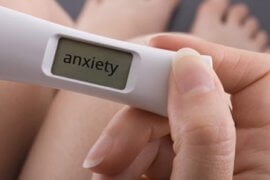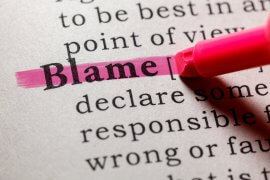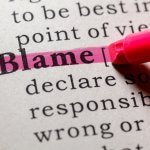
I am a nurse practitioner and a health coach who specializes in helping pregnant, or soon-to-be pregnant, women achieve their health goals. Many of my clients have bigger bodies and I, technically, am ‘standard’ weight, according to the very flawed BMI chart. As a result, I am frequently asked or emailed a version of the question below, as people wonder why, if I don’t have personal experience with obesity, am I so passionate about advocating for those who do. As is often the case, growth follows discomfort, and, for me, a painful event in childhood equipped me with the tools I needed to advocate for people of all shapes and sizes.
Dear Monica,
I love your blog posts and your “Ask Monica” series. You state that you’re an advocate for people in bigger bodies. Were you ever fat and, if so, how did you lose the weight? If not, why do you feel so strongly about this topic?
Thanks,
Dana
Dear Dana,
I started my career as an Infertility Nurse Practitioner but realized that I ideally wanted to spend more time talking to my patients about their physical, metabolic, and emotional health, and not just the medical aspects of fertility. So, I became a health coach and, as such, I have developed deep relationships with my clients (many of whom are women in bigger bodies) who share with me their personal narratives of shame and humiliation due to their weight.
Almost every single one of them has told me how important it is to have an advocate, someone to stand up to the fat-shaming that they often encounter.
Although I have not been mocked for my weight, I have been derided due to my appearance. It happened in seventh grade, when I was bullied on my school bus. The remarks and taunts were daily and relentless. My not-yet-diagnosed polycystic ovarian syndrome (PCOS) was raging, and every day it seemed I had a new pimple on my face or grew a dozen new body hairs. I am Italian-American, so there was no shortage of body hair anyway, but suddenly it seemed that my hair growth was supercharged and incredibly obvious.
My appearance did not go unnoticed by a girl on my bus (whom we will call) Tricia. She called me names like Fuzzy Muzzi (Muzzi is my maiden name) and gleefully and mercilessly taunted me on the way to and from school. She warned me that I would never have a boyfriend ‘looking like I do’ and that the girls I thought were my friends were just pretending because they felt sorry for me.
It seemed that she spent her time and energy finding new words for ‘ugly’, and I spent mine trying not to cry.
Of course, I told my parents, whose advice was to ignore her (although my mom used this inopportune time to give me an eyebrow-plucking tutorial). I begged them to drive me to school, but neither of them had jobs that allowed this.
I begged the driver to let me change my seat, but all seventh graders sat in the same section.
So, I had to deal with Tricia, her taunts, and the interminable bus ridesfor the remainder of the school year. I don’t even remember how long it lasted or how it ended (I think she found someone else to harass) but here is what I do remember: hot shame, embarrassment, and the confirmation of what I already knew: I was unattractive, gross, and unacceptable.
I had friends who rode that bus, but they didn’t defend me for fear that they would become her next target. Some of them didn’t even want to sit with me for the same reason. Although I now understand this, I felt isolated and alone. The situation seemed unbearable.
I remember feeling helpless and anxious as I walked up the stairs of that bus day after day, like I was entering a firing squad without armor. It took me a long time (and hours of laser hair removal) to believe in my self-worth again, and I am still triggered by certain situations that remind me of being the target of a bully. Even as I write this, thirty-plus years later, I recognize the tight knot of anxiety and shame in my chest and feel my eyes burning as I visualize myself at that age.
I wish I could go back and hug the seventh-grade me and assure her everything will work out.
So, to answer Dana’s question, no I was never *fat but I was a target, due to my looks. I felt angry, sad, and helpless at being ridiculed for something beyond my control, which I can imagine is not dissimilar to my clients’ personal experiences with being the victim of weight bias.
The science behind bodyweight (and weight loss) is clear. Our bodies have an evolutionary adaptation to avoid (what is perceived as) famine. Once weight is gained, the body employs many metabolic adaptations to keep it there, and the higher weight becomes the body’s new set point. Gaining excess weight is easy. Many who fall in the ‘obesity’ categories on the BMI chart have a strong genetic tendency to gain excess weight, quite possibly as strong as a tall person’s predisposition to being tall. This genetic disposition combined with an environment where ultra-processed food is plentiful and cheap, and the common habit of emotional eating, create the perfect cocktail for excess weight. Diets don’t work and exercise is great for mental benefits, but as recent data shows that when someone in bigger body exercises, their brain conserves energy in other ways to maintain their current weight.
Consequently, I always stress that people with obesity have bigger bodies not because of what they do, but despite what they do.
Women in bigger bodies live in a world that is full of people like Tricia. The fat-shaming that they experience is constant and relentless and certainly doesn’t help them lose weight. It has the opposite effect. Studies show that being the recipient of weight bias contributes to weight gain and weight cycling, two factors that contribute to obesity.
I now see Tricia as my teacher and the situation on the bus as my classroom. The author Glennon Doyle writes: “Pain is not a hot potato to pass on to the next person or generation. Pain is not a mistake to fix. Pain is just a sign that a lesson is coming. Discomfort is purposeful: it is there to teach you what you need to know so you can become who you were meant to be. Pain is just a traveling professor.”
I use the helplessness that I felt then as motivation to be the person that I wished I had in seventh grade. I empower and advocate for my coaching clients by providing information and support and, in doing so, help them reclaim any dignity that they may have lost by being the recipient of discrimination and cruelty. Most importantly I try to make a dent in a deeply-flawed health care system where we are trained to manage the consequences of excess weight, but not informed about the factors that lead to it.
Those of us who care for people with obesity need to understand the complexities and nuances of excess weight and our body’s determination to hold onto it. Most health care providers are well-meaning but, like me and all the nurses and doctors that I know, not formally trained on the science or behavioral aspects of excess weight and how to combat it.
As a health coach, my job isn’t to help women to become thin. My job is to help women become the best version of themselves, whatever that looks like.
By the way, I did find Tricia on social media recently and sent her a message thanking her for making me who I am today. I didn’t receive a response but then, none is needed.
*Author’s Note: I am following Dana’s lead and using the word ‘fat’ as a neutral, descriptive word, not as a pejorative term.







